republic onboarding
Internet Banking
-
Savings & Chequing
-
Savings Accounts
Growing up with a plan for tomorrow
For youths between the ages 13 to 19 years
Shape your future
Helps you to build your nest egg
Saves you time and money
The wise investment instrument
Earn more on your Foreign Accounts
Chequing Accounts
Bank FREE, easy and convenient
A world of convenience and flexibity
Invest and enjoy the best of both worlds
A value package designed for persons 60 +
Life Stage Packages
Banking on your terms
Getting married?
Tools & Guides
Make an informed decision using our calculators
Help choose the account that’s right for you
All Our Cheques Have A New Look!
-
-
Electronic Banking
-
EBS Products
Open a deposit account online
Pay bills and manage your accounts easily
Banking on the Go!
Welcome to the Cashless Experience
Top up your phone/friend’s phone or pay utility bills for FREE!
EBS Products
Make secure deposits and bill payments
Access your accounts easily and securely with the convenience of Chip and PIN technology and contactless transactions.
Access cash and manage your money
Where your change adds up
-
-
Credit cards
-
Credit Cards
Credit Cards
Additional Information
-
-
Prepaid Cards
-
Pre-paid Cards
-
-
Loans
-
overview
To take you through each stage of life, as we aim to assist you with the funds you need for the things you want to do
We make it easy to acquire financial assistance for tertiary education through the Higher Education Loan Programme
We make it easy, quick and affordable to buy the car of your dreams
Tools & Guides
Helps you determine the loan amount that you can afford
You can calculate your business’ potential borrowing repayments
Republic Bank's Group Life Insurance will provide relief to your family by repaying your outstanding mortgage, retail or credit card balance in the event of death or disablement.
-
-
Mortgages
-
Mortgage Centre
Republic Bank Limited can make your dream of a new home a quick and affordable reality
New Customers
Block for MM- new user mortgage process
There are three stages you must complete before owning your first home
Tools & Guides
block for MM - personal - mortgages
-
-
Investments
-
Investment Products
-
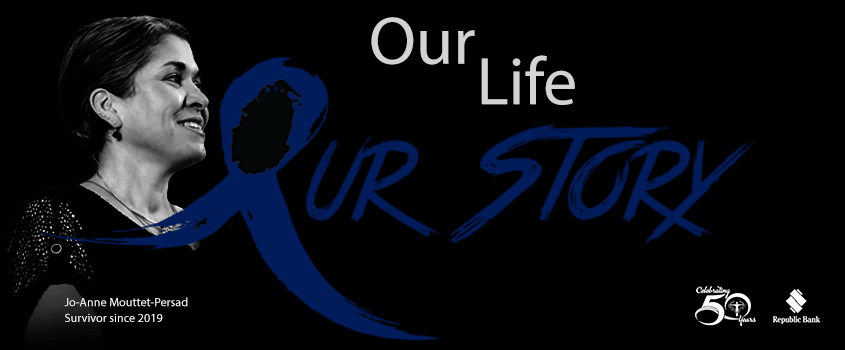
“Do you ever cry, Jo-Anne?”
“Not really. The only time I really cried was when I had to be admitted to the nursing home for infusion of my last two chemotherapy cycles which required supervision. This was a result of my injectable port being removed prematurely because it was compromised. My doctors were more worried about my husband. [laughs] He has been such great support,” Jo-Anne said. Her strength was admirable, almost chilling. After three battles with cancer, Jo-Anne Mouttet-Persad remained stoic but optimistic, while telling her story.
“I don’t want to die from cancer. I don’t. I’ve had relatives and friends who distanced themselves. I had an aunt who would say things to my sister like ‘thought you were bald and wasted away.’ People are ignorant. They don’t know how to speak to people when they are diagnosed with cancer. Cancer isn’t contagious.”
The youngest of eight children, the first time Jo-Anne ever heard of or experienced cancer was during her sister’s diagnosis with Hodgkin’s Lymphoma.
“She was diagnosed in 1992. She was sick for a while. She had lymph nodes on her neck, a lot of chest pains and acid reflux. I remember my mother taking her to the doctor and nobody being able to say what was wrong until two years after. One doctor did a biopsy on her neck [the lymph node] and she was diagnosed with stage 4 Hodgkin’s Lymphoma. That was the first time I ever heard of cancer. I was a teenager.”
Jo-Anne’s sister underwent treatment and recovered. However, a couple years later, Joanne fell ill.
“My symptoms were different from my sister’s. I used to get bad joint pains, itchy skin, night sweats, and pain in my legs. Every doctor we went to, my mom told them about my sister’s diagnosis asking them if I had the same thing.”
For two years, Jo-Anne was misdiagnosed. Her symptoms were dismissed as rheumatoid arthritis, a leg length discrepancy and endocarditis. An MRI done locally was misread, and once again, her fears were dismissed. During that time, Jo-Anne developed a persistent dry cough.
One year later her symptoms persisted. A chest x-ray done locally, revealed a 10cm tumor in Jo-Anne’s mediastinum. Despondent about her previous misdiagnoses, but optimistic, Jo-Anne sought advice from the family doctor – a thoracic surgeon based in Melbourne, Florida. Subsequently, a full body CT scan conducted in Florida revealed that in addition to the 10cm tumor in her mediastinum, Jo-Anne had lesions on both lungs, a tumor in her paravertebral gutter and lesions on her liver.
A needle aspiration of the left lung, followed by the removal and biopsy of the right auxiliary lymph node confirmed that at 19, Jo-Anne had stage 4 Hodgkin’s Lymphoma. Jo-Anne immediately underwent a treatment plan including 12 cycles of chemotherapy and 35 cycles of radiation.
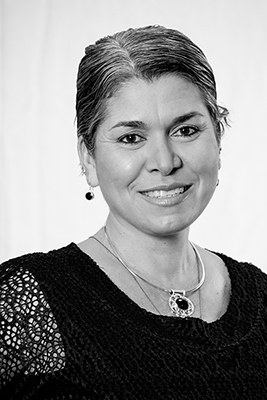
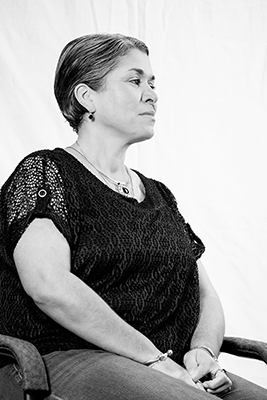
But seventeen years after her recovery, Jo-Anne developed underactive thyroids.
“I developed underactive thyroids because when I did radiation here [locally], they did not protect my thyroids, so I developed multinodular goiters.”
Jo-Anne returned to Florida to have a biopsy done due to the high risk of developing thyroid cancer. Luckily, the results returned negative, but within a year Jo-Anne noticed a spot on her chest that bled when touched. That spot turned out to be Basal Cell Carcinoma – a type of skin cancer common in cancer patients who received radiation during treatment. Jo-Anne had the spot removed soon after.
After years of being prodded and poked, misdiagnosed, and battling with two types of cancers, Jo-Anne made a greater effort to understand changes within her body while getting routinely checked locally and in Florida.
“I always stay on top of it. Whatever I need to do, I stick to my appointments and I’m very in tuned with my body. Your body speaks to you.” ,/p>
In July 2013, Jo-Anne had an abnormal Pap smear result, and after several various failed treatments, she was advised by her gynecologist to have a hysterectomy done.
“In April, 2017 I had the hysterectomy done, but before I had it done, I wasn’t feeling well, and I kept telling him [gynecologist] how I was feeling. He thought whatever I was feeling was due to my heavy period [menstrual cycle]. I did the hysterectomy, but I always felt like I never recovered and when I went back to him, he said, ‘I think you’re just depressed.’ But I knew something was wrong.”
________________________________________According to Chairman of the Trinidad and Tobago Cancer Society, Dr. Asante Le Blanc, Jo-Anne’s experience should serve as a caution for people to begin making lifestyle changes and understanding their bodies, as well as a wake-up call for some medical practitioners to refrain from dismissing their patient’s claims. “When an individual expresses concern, they expect answers or at the very least an effort to find those answers, not to be dismissed or turned away. Every day we see more people doing research and understanding their bodies and how different things affect them, but in order to continue the fight against all cancers, there must be effort on both parts, including the doctors and the population. If you feel as if your claims have been dismissed, I encourage anyone to reach out to the TTCS,” Le Blanc said.
________________________________________In February 2018, Jo-Anne began experiencing a range of symptoms including immobility, weakness, and dizziness. Being in-tuned with her body’s functions, she had a blood test done which revealed a hemoglobin level of 5.3 grams per deciliter, a critically low blood oxygen level. She was given a strong recommendation to have a blood transfusion.
“I was feeling so terrible, I said to the doctor, ‘Do you think I’ll die overnight?’”
Jo-Anne returned to her personal medical doctor locally who recommended a stool test and medication to increase her blood levels so she would be able to return to Florida for further testing. When she returned to Florida, a colonoscopy and a PET scan revealed a tumor in her ascending colon – she was diagnosed with stage 2 colon cancer. Jo-Anne had a right hemicolectomy done and returned to Trinidad for recovery and treatment, including 12 cycles of chemotherapy.
Even after three different experiences with cancer, Jo-Anne admits that she hasn’t given up and doesn’t plan to.
“I have three children and one of them is seven. I must live to see him grow up, he is the youngest and he got overly attached to me after being away from him for nearly six weeks. When I told them about my colon cancer diagnosis, my eldest son pulled away and put up a wall. He didn’t want to be close to me, it hurt me, but I understood that he was fearful. They had gone through this with my sister-in-law who died. My second son had already researched online about my diagnosis and did not want any further explanation.”
At 43, Jo-Anne is now cancer free, but continues to maintain routine check-ups and lives a normal life. “I am a FIGHTER! I’m thankful for my strong foundation, my faith and my beliefs. I am thankful for the love, support and understanding of my family, which I believe plays an important role in a person’s mindset and recovery. God continues to work miracles in my life! For this I’m eternally grateful.” “Some people believe that cancer is a death sentence, or they think they’ve done something wrong in their life to get cancer – I don’t think like that. I just say, ‘God, I don’t know what your plan is for me but just keeping guiding my doctors.” 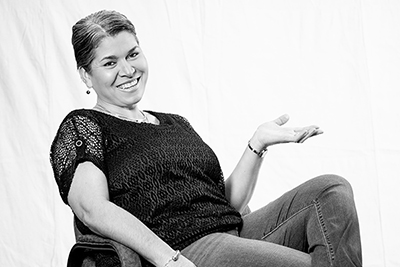
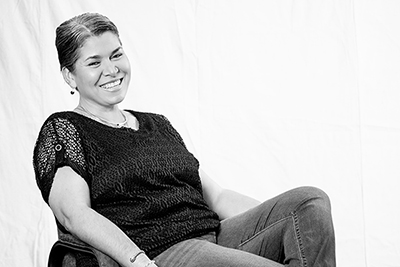
Event Calendar
COMPANY INFORMATION
Banking Segments
Press & Media
Contact Us
© 2026 Republic Bank Limited. All Rights reserved.








